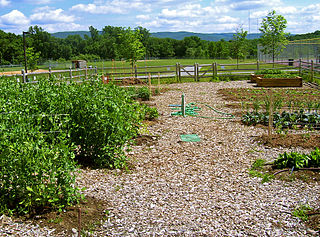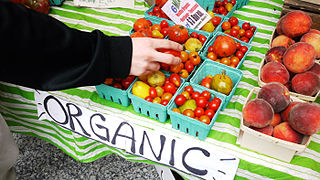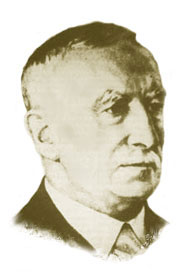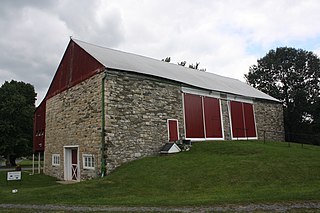
Compost is a mixture of ingredients used as plant fertilizer and to improve soil's physical, chemical, and biological properties. It is commonly prepared by decomposing plant and food waste, recycling organic materials, and manure. The resulting mixture is rich in plant nutrients and beneficial organisms, such as bacteria, protozoa, nematodes, and fungi. Compost improves soil fertility in gardens, landscaping, horticulture, urban agriculture, and organic farming, reducing dependency on commercial chemical fertilizers. The benefits of compost include providing nutrients to crops as fertilizer, acting as a soil conditioner, increasing the humus or humic acid contents of the soil, and introducing beneficial microbes that help to suppress pathogens in the soil and reduce soil-borne diseases.

Organic farming, also known as ecological farming or biological farming, is an agricultural system that uses fertilizers of organic origin such as compost manure, green manure, and bone meal and places emphasis on techniques such as crop rotation and companion planting. It originated early in the 20th century in reaction to rapidly changing farming practices. Certified organic agriculture accounts for 70 million hectares globally, with over half of that total in Australia. Organic farming continues to be developed by various organizations today. Biological pest control, mixed cropping and the fostering of insect predators are encouraged. Organic standards are designed to allow the use of naturally-occurring substances while prohibiting or strictly limiting synthetic substances. For instance, naturally-occurring pesticides such as pyrethrin are permitted, while synthetic fertilizers and pesticides are generally prohibited. Synthetic substances that are allowed include, for example, copper sulfate, elemental sulfur and Ivermectin. Genetically modified organisms, nanomaterials, human sewage sludge, plant growth regulators, hormones, and antibiotic use in livestock husbandry are prohibited. Organic farming advocates claim advantages in sustainability, openness, self-sufficiency, autonomy and independence, health, food security, and food safety.

Permaculture is an approach to land management and settlement design that adopts arrangements observed in flourishing natural ecosystems. It includes a set of design principles derived using whole-systems thinking. It applies these principles in fields such as regenerative agriculture, town planning, rewilding, and community resilience. Permaculture originally came from "permanent agriculture", but was later adjusted to mean "permanent culture", incorporating social aspects. The term was coined in 1978 by Bill Mollison and David Holmgren, who formulated the concept in opposition to modern industrialized methods instead adopting a more traditional or "natural" approach to agriculture.

Masanobu Fukuoka was a Japanese farmer and philosopher celebrated for his natural farming and re-vegetation of desertified lands. He was a proponent of no-till, herbicide and pesticide free cultivation methods from which he created a particular method of agriculture, commonly referred to as "natural farming" or "do-nothing farming".
No-dig gardening is a non-cultivation method used by some organic gardeners. The origins of no-dig gardening are unclear, and may be based on pre-industrial or nineteenth-century farming techniques. Masanobu Fukuoka started his pioneering research work in this domain in 1938, and began publishing in the 1970s his Fukuokan philosophy of "do-nothing farming" or natural farming, which is now acknowledged by some as the tap root of the permaculture movement. Two pioneers of the method in the twentieth century included F. C. King, Head Gardener at Levens Hall, South Westmorland, in the Lake District of England, who wrote the book "Is Digging Necessary?" in 1946 and a gardener from Middlecliffe in the UK, A. Guest, who in 1948 published the book "Gardening Without Digging". The work of these gardeners was supported by the Good Gardeners Association in the UK. No-dig gardening was also promoted by Australian Esther Deans in the 1970s, and American gardener Ruth Stout advocated a "permanent" garden mulching technique in Gardening Without Work and no-dig methods in the 1950s and 1960s.
The following outline is provided as an overview of and topical guide to sustainable agriculture:

The following outline is provided as an overview of and topical guide to organic gardening and farming:

The organic movement broadly refers to the organizations and individuals involved worldwide in the promotion of organic food and other organic products. It started during the first half of the 20th century, when modern large-scale agricultural practices began to appear.
Eliot Coleman is an American farmer, author, agricultural researcher and educator, and proponent of organic farming. He wrote The New Organic Grower. He served for two years as Executive Director of the International Federation of Organic Agriculture Movements (IFOAM), and was an advisor to the U.S. Department of Agriculture during its 1979–80 study, Report and Recommendations on Organic Farming, a document that formed the basis for today's legislated National Organic Program (2002) in the U.S.

Sir Albert Howard was an English botanist. His academic background might have been botany. While working in India he was generally considered a pathologist; this more than likely being the reason for his consistent observations of the value of compost applications being an increase in health. Howard was the first Westerner to document and publish the Indian techniques of sustainable agriculture. After spending considerable time learning from Indian peasants and the pests present in their soil, he called these two his professors. He was a principal figure in the early organic movement. He is considered by many in the English-speaking world to have been, along with Rudolf Steiner and Eve Balfour, one of the key advocates of ancient Indian techniques of organic agriculture.
Biointensive agriculture is an organic agricultural system that focuses on achieving maximum yields from a minimum area of land, while simultaneously increasing biodiversity and sustaining the fertility of the soil. The goal of the method is long term sustainability on a closed system basis. It is particularly effective for backyard gardeners and smallholder farmers in developing countries, and also has been used successfully on small-scale commercial farms.

Organic horticulture is the science and art of growing fruits, vegetables, flowers, or ornamental plants by following the essential principles of organic agriculture in soil building and conservation, pest management, and heirloom variety preservation.

Jerome Irving Rodale was a publisher, editor, and author who founded Rodale, Inc. in Emmaus, Pennsylvania, and The Rodale Institute, formerly the Soil Health Foundation.

Traditional farming was the original type of agriculture, and has been practiced for thousands of years. All traditional farming is now considered to be "organic farming" although at the time there were no known inorganic methods. For example, forest gardening, a fully organic food production system which dates from prehistoric times, is thought to be the world's oldest and most resilient agroecosystem. The industrial revolution introduced inorganic methods, most of which were not well developed and had serious side effects. An organic movement began in the 1940s as a reaction to agriculture's growing reliance on synthetic fertilizers and pesticides. The history of this modern revival of organic farming dates back to the first half of the 20th century at a time when there was a growing reliance on these new synthetic, non-organic methods.

Ehrenfried Pfeiffer was a German scientist, soil scientist, leading advocate of biodynamic agriculture, anthroposophist and student of Rudolf Steiner.

Rodale Institute is a non-profit organization that supports research into organic farming. It was founded in Emmaus, Pennsylvania in 1947 by J. I. Rodale, an organic living entrepreneur. After J.I. Rodale died in 1971, his son Robert Rodale purchased 333 acres and moved the farm to Kutztown, Pennsylvania.
The Student Sustainable Farm at Rutgers is located at Rutgers' Horticultural Research Station in New Brunswick, New Jersey, on the G. H. Cook campus of Rutgers University.

Regenerative agriculture is a conservation and rehabilitation approach to food and farming systems. It focuses on topsoil regeneration, increasing biodiversity, improving the water cycle, enhancing ecosystem services, supporting biosequestration, increasing resilience to climate change, and strengthening the health and vitality of farm soil.

Frank Newman Turner, NDA, NDD, FNIMH, was a British pioneering organic farmer, writer and broadcaster, who, based on his experience of natural treatment of animals, later became a consulting medical herbalist and naturopath. His books Fertility Farming, Fertility Pastures, and Herdsmanship are regarded as classics of practical organic husbandry.
Friend Sykes (1888–1965) was an English organic farmer and writer.











